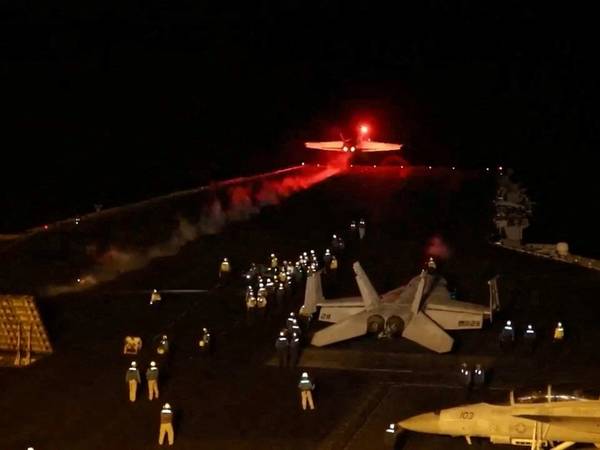Iran-backed Houthis attempted to hit a US warship in the Red Sea on Sunday, but their missile was intercepted, according to the US military.
This latest Houthi attack comes only a few days after the airstrikes by the US and Britain on dozens of Houthi sites in Yemen, signaling that the group, which claims to be acting in support of Gaza under the Israeli onslaught, is not just undeterred but may be radicalized.
Shortly after the airstrikes last week, the Houthi leadership spoke of retaliation and threatened that all American and British interests would be “legitimate targets”.
Sunday afternoon (Yemen time), the Houthis fired an anti-ship cruise missile” towards USS Laboon (DDG 58), according to US Central Command. “The missile was shot down in vicinity of the coast of Hudaydah by U.S. fighter aircraft. There were no injuries or damage reported.”
The Houthis are no match for US and UK military power, but they seem to have enough determination and weaponry –provided by Iran– to make the Red Sea entirely unsafe for shipping, and escalate the conflict in the Middle East.
Initial assessments from the US suggests that no more than a quarter of the Houthis’ capability has been destroyed in the US/UK airstrikes.
The intercepted attack on a US warship may mean more airstrikes against Houthi targets in Yemen, something that most countries in the region, including US ally Saudi Arabia and Nato member Turkey, do not like for different reasons.
President Biden said following the airstrikes that there could be more if the Houthis don’t back down. He did issue a thinly veiled warning to the Iranian regime as well, saying a message had been delivered and they wouldn't do anything. Any further Houthi aggression could be testing for Biden as he’d have to juggle domestic calls for a show of strength and calls for restraint from crucial regional countries.
Britain will "wait and see" before deciding to launch fresh military strikes against the Iran-aligned Houthis in Yemen in order to protect international shipping, Defense Secretary Grant Shapps said on Monday.
"Let's wait and see what happens, because it's not that we want to be involved in action in the Red Sea. But ultimately freedom of navigation is an international right," Shapps told Sky News, when asked if Britain would carry out more strikes.
All this comes amid an ongoing Israeli onslaught on Gaza, which Biden wants to contain as he enters the 2024 election campaign begins in earnest
A new poll by ABC and Ipsos shows Biden’s approval rating has fallen to its lowest and “a record low for his presidency and for any president in the last 15 years."
In the survey, conducted the first week of January, only 33 percent of those surveyed said they approved of Biden, a 4-points drop from the previous poll in September 2023, while 58 percent said they disapproved of his performance, a 2-points rise since September.
The situation in the Middle East is likely to surface as a key theme during the election campaign, especially since Biden’s unconditional support for Israel seems to be losing him indispensable Arab/Muslim votes in such key states as Michigan –as well as some younger ‘progressive’ votes.
On the 100th day of the Israeli war on Gaza, the White House national security council spokesman John Kirby said that the Biden administration had been discussing with Israel “a transition to low-intensity operations” in Gaza.
“We believe it’s the right time for that transition,” he said in an interview with CBS. “And we’re talking to them about doing that.”
